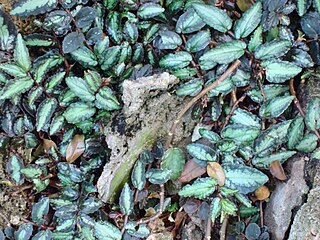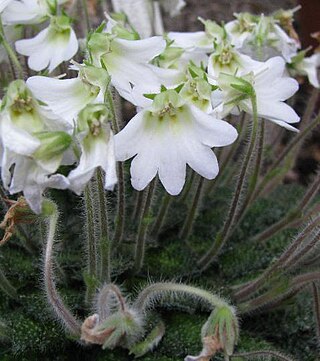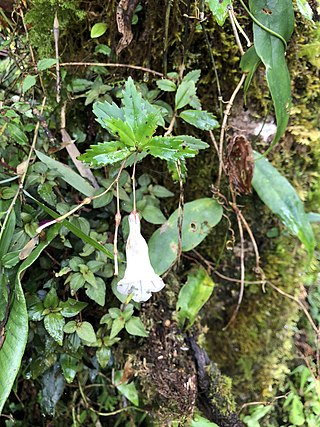
Anemone is a genus of flowering plants in the buttercup family Ranunculaceae. Plants of the genus are commonly called windflowers. They are native to the temperate and subtropical regions of all regions except Australia, New Zealand, Antarctica and the Middle East. The genus is closely related to several other genera including Anemonoides, Anemonastrum, Hepatica, and Pulsatilla. Some botanists include these genera within Anemone.

Dracocephalum is a genus of flowering plants in the family Lamiaceae, native to temperate regions of the Northern Hemisphere. These flowers, collectively called dragonhead, are annual or perennial herbaceous plants or subshrubs, growing to 15 to 90 centimeters tall. The genus has 89 species as currently circumscribed, which includes the formerly separate genera Hyssopus, Lallemantia, and others. Older circumscriptions include 60 to 70 species.

Ranunculaceae is a family of over 2,000 known species of flowering plants in 43 genera, distributed worldwide.

Ampelopsis, commonly known as peppervine or porcelainberry, is a genus of climbing shrubs, in the grape family Vitaceae. The name is derived from the Ancient Greek: ἅμπελος (ampelos), which means "vine". The genus was named in 1803. It is disjunctly distributed in eastern Asia and eastern North America extending to Mexico. Ampelopsis is primarily found in mountainous regions in temperate zones with some species in montane forests at mid-altitudes in subtropical to tropical regions. Ampelopsis glandulosa is a popular garden plant and an invasive weed.

The Sapotaceae are a family of flowering plants belonging to the order Ericales. The family includes about 800 species of evergreen trees and shrubs in around 65 genera. Their distribution is pantropical.

Aeschynanthus is a genus of about 150 species of evergreen subtropical and tropical plants in the family Gesneriaceae. They are usually trailing epiphytes with brightly colored flowers that are pollinated by sunbirds. The genus name comes from a contraction of aischuno and anthos (flower). The common name for some species is lipstick plant, which comes from the appearance of the developing buds emerging from the calyces. A full list of the accepted species and their synonyms can be found in the Smithsonian Institution's World Checklist of Gesneriaceae.

Vitis (grapevine) is a genus of 81 accepted species of vining plants in the flowering plant family Vitaceae. The genus consists of species predominantly from the Northern Hemisphere. It is economically important as the source of grapes, both for direct consumption of the fruit and for fermentation to produce wine. The study and cultivation of grapevines is called viticulture.
Placodiscus is a genus of plant in family Sapindaceae. The following species are accepted by Plants of the World Online:

Pellionia is a genus of flowering plants in the family Urticaceae. The flowers of Pellionia are white globules held on stalks above the plant, which respond to changes in temperature by releasing their pollen as little puffs of smoke.

Petrocosmea is a genus of the family Gesneriaceae, the African violet family. Most of the species within this genus are endemic to high-altitude areas in Western China, although some are native to other parts of Asia. It is a rosette forming genus that generally grows on wet mossy rocks or forests.
Anigre is an African hardwood commonly used for plywood, interior furniture, cabinetry, and high-end millwork applications. It is frequently sliced and sold as veneer, although it is available in board form as well. In board form it is used for boat building, general carpentry, and other light construction uses.

Primulina is a genus of flowering plants in the African violet family Gesneriaceae. In 2011 the genus was expanded with the transfer of many species that had previously been placed in the genus Chirita. In 2016, five species were moved to the genus Deinostigma.

Deinostigma is a genus in the family Gesneriaceae, native to Vietnam and Southern China. In 2016 the genus was expanded with the transfer of several species that had previously been place in the genus Primulina, to include a total of seven species.

Lysionotus is a genus of flowering plants in the family Gesneriaceae. It occurs in the Himalayas, China, Japan, and Southeast Asia. The genus was described by David Don in 1822.
Utsetela is a genus of flowering plants belonging to the family Moraceae.
Beccarinda is a genus of flowering plants belonging to the family Gesneriaceae.
Gyrocheilos is a genus of flowering plants belonging to the family Gesneriaceae.

Metapetrocosmea is a genus of flowering plants belonging to the family Gesneriaceae. It includes ten species native to southern China, Hainan, and Vietnam.
Dichocarpum is a genus of flowering plants belonging to the family Ranunculaceae.

Oreocharis is a genus of flowering plants in the family Gesneriaceae. It includes 154 species native to Asia, which range from the Eastern Himalayas and Tibet through Indochina and China to Japan.













